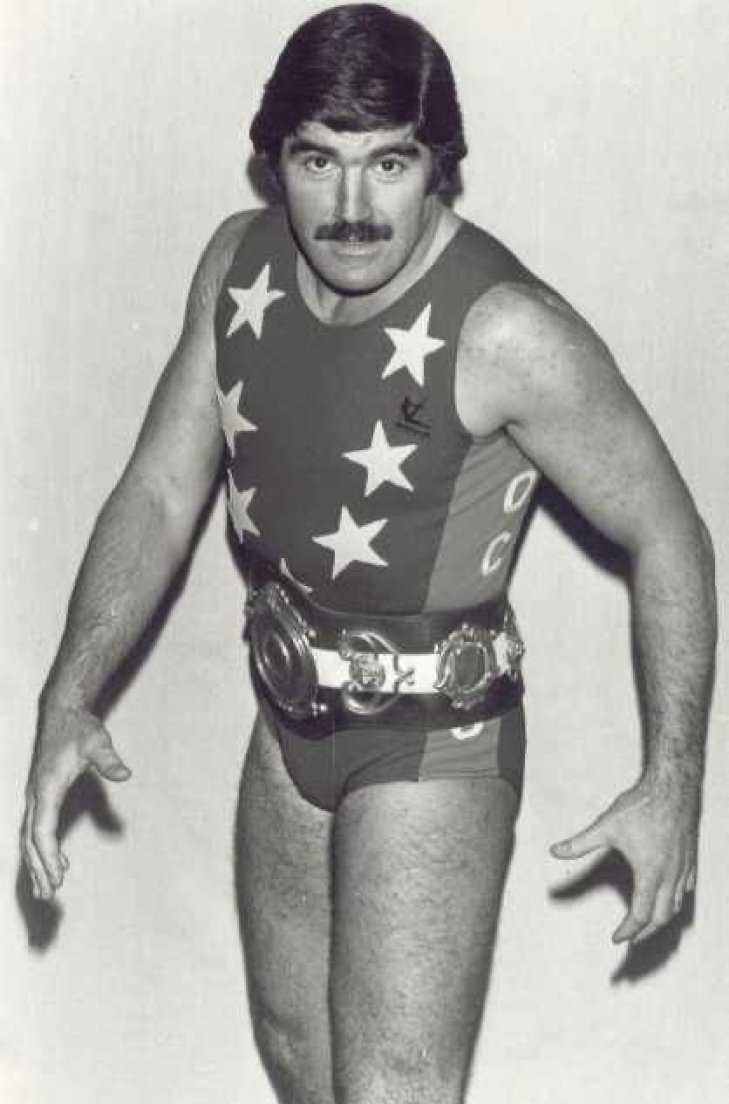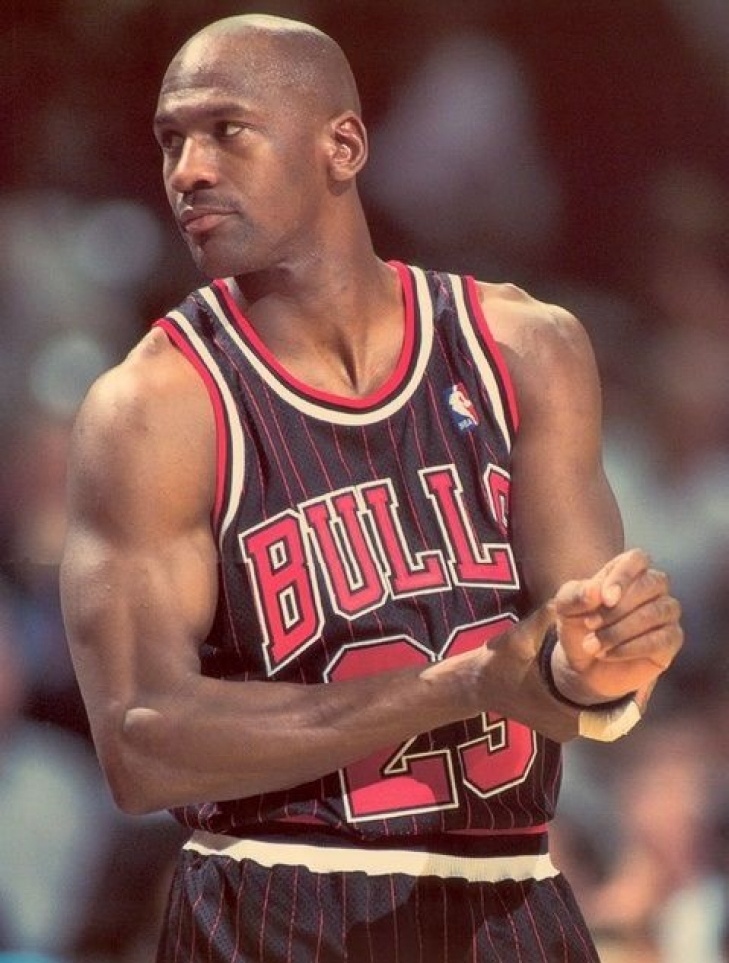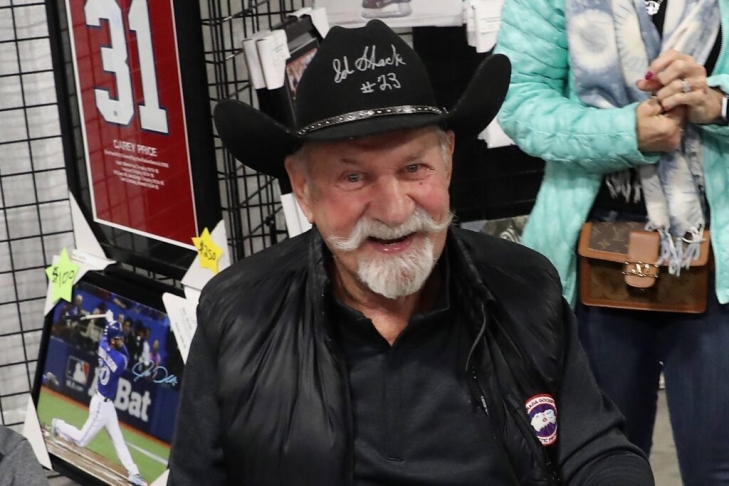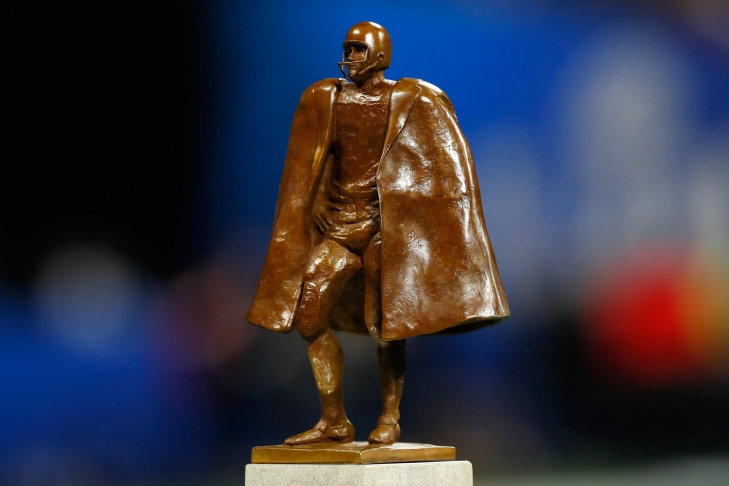
Committee Chairman
RIP: Mark "Rollerball" Rocco
It was announced today that British wrestling legend, Mark “Rollerball” Rocco, passed away at the age of 69.
Born Mark Hussey in 1951, Rocco is believed to have made his pro wrestling debut in 1970, and he competed mostly in the United Kingdom through the decade. Rocco, who was a lighter-weight competitor in Britain, was contacted by New Japan Pro Wrestling to wrestle for them.
Rocco was packaged as “Black Tiger”, a character designed to feud with the original Tiger Mask (Satoru Sayama), and he would win the WWF Junior Heavyweight Title. He returned back to England, performing mostly for All-Star Wrestling.
Rocco was a precursor to much of the high-flying style that is part of pro wrestling today. In our latest list of those to consider for the WWE Hall of Fame, Rocco was ranked at #355.
We here at Notinhalloffame.com would like to extend our condolences to the friends, fans and family of Mark Rocco.
Why's Michael Jordan the Most Bettable Sportsman?
If you ask any basketball fan who their favourite player is then chances are that 9 out of 10 times the name you'd hear is Michael Jordan. Michael Jordan is undoubtedly one of the greatest in the world of basketball. He was responsible for the sudden growth in popularity of the NBA back in the 1980s. His incredibly flamboyant style of playing and his high jumps found him titles like Air Jordan and His Airness, names that have stuck to this day. Between him and Scottie Pippen, they turned around the fortunes of the Chicago Bulls making the team one of the greatest of that era.
The Chicago Bulls won six championship titles with Michael Jordan which pretty much made him one of the most bettable sportsmen of the time. Sports betting back in those days was very different from what it is now. These days, one can go online and even bet on virtual sports like this article describes. If Michael Jordan were playing today, he would most definitely be one of the most bankable players. His sheer talent and skill is also the reason why he was so popular. In fact here are a few reasons for his popularity and his dependability.
He can act
Sure, Michael Jordan can play basketball but can he act? Yes, he can! Michael Jordan made his debut in Hollywood in a most bizarre movie called Space Jam where he acted opposite not human beings but cartoon characters. His co-stars were the iconic Daffy Duck and Bugs Bunny from Looney Tunes. The story is about a bunch of aliens coming down to earth to enslave these characters as well as steal some basketball talent from the guys at NBA. Michael Jordan manages to come to the rescue as he always does.
He can play even with the flu
Most people would be in bed, sipping hot soup and resting when they get the flu but not Michael Jordan. He gets up and plays basketball. The match between Chicago Bulls and Utah Jazz featuring a flu-ridden Michael Jordan is one for the history books because he leads the team to a crazy 90-88 win before finally collapsing in a heap.
The Last Shot
Michael Jordan's last match was in 1998 before retirement. The Chicago Bulls were playing against Utah Jazz. Michael Jordan dribbled his way through Bryon Russell and then gently pushed him and stole an opportunity to win a point. This won him his final title and the match has gone down in history as one of the greatest ever. No wonder then that the shoes he wore during that match fetched thousands of dollars at a recent auction.
These are just some of the high points of MJ's career that made him one of the most dependable sportsmen ever. It was so difficult to keep him out of the game that he even returned to the court at the age of 40 and managed to score 43 points against New Jersey Nets.
RIP: Eddie Shack
One of the most colorful figures in the history of hockey has passed away, as Eddie Shack died this morning at the age of 83 following a battle with throat cancer.
From Sudbury, Ontario, Shack broke in with the New York Rangers in 1958, but he was traded to the Toronto Maple Leafs in 1960, where he became one of the most popular players in the city. Shack helped the Leafs win four Stanley Cup rings, and while he was not a skilled playmaker, he was a rough and tumble player known for his colorful and jovial nature.
Shack was so popular, that a Canadian garage band named the Secrets wrote a song called “Clear the Track, Here Comes Shack”, that went to number one in Canada. Shack’s career extended until 1975 where he also played in Boston, Los Angeles, Buffalo and Pittsburgh.
After his playing career ended, “The Entertainer” was a national spokesman for the Pop Shoppe and Schick.
We here at Notinhalloffame.com would like to extend our condolences to the friends, fans and family of Eddie Shack.
Awards = HOF?: Part Fifty: The NFL Walter Payton Man of the Year Award
We here at Notinhalloffame.com thought it would be fun to take a look at the major awards in North American team sports and see how it translates into Hall of Fame potential.
Needless to say, different awards in different sports yield hall of fame potential. In basketball, the team sport with the least number of players on a roster, the dividend for greatness much higher. In baseball, it is not as much as a great individual season does not have the same impact.
Last time, we looked at the J. Walter Kennedy Citizenship Award of the NBA. This time we look at its Football counterpart, the Walter Payton Man of the Year.
The Walter Payton Man of the Year Award originated in 1970, and is given to the player honoring a player’s volunteer and charity work. It was originally named the Man of the Year, and it was renamed in the honor of former winner and Pro Football Hall of Famer, Walter Payton, after he died in 1999.
While this is generally given to star players, we will not dissect the season in question as the award is not meant to be defined by stat lines and on field accomplishments.
So how many Walter Payton Man of the Year Award winners have made the Pro Football Hall of Fame?
Let’s find out!
The following are the past players who have won the Walter Payton Man of the Year Award who are eligible for the Pro Football Hall of Fame and have been enshrined.
Johnny Unitas, Baltimore Colts 1970
Inducted into the Hall of Fame in 1979.
Willie Lanier, Kansas City Chiefs 1972
Inducted into the Hall of Fame in 1986.
Len Dawson, Kansas City Chiefs 1973
Inducted into the Hall of Fame in 1987.
George Blanda, Oakland Raiders 1974
Inducted into the Hall of Fame in 1981.
Franco Harris, Pittsburgh Steelers 1976
Inducted into the Hall of Fame in 1980.
Walter Payton, Chicago Bears 1977
Inducted into the Hall of Fame in 1993.
Roger Staubach, Dallas Cowboys 1978
Inducted into the Hall of Fame in 1985.
Joe Greene, Pittsburgh Steelers 1979
Inducted into the Hall of Fame in 1987.
Harold Carmichael, Philadelphia Eagles 1980
Inducted into the Hall of Fame in 2020.
Lynn Swann, Pittsburgh Steelers 1980
Inducted into the Hall of Fame in 2001.
Dwight Stephenson, Miami Dolphins 1985
Inducted into the Hall of Fame in 1988.
Steve Largent, Seattle Seahawks 1988
Inducted into the Hall of Fame in 1985.
Warren Moon, Houston Oilers 1989
Inducted into the Hall of Fame in 2000.
Mike Singletary, Chicago Bears 1990
Inducted into the Hall of Fame in 1998.
Anthony Munoz, Cincinnati Bengals 1991
Inducted into the Hall of Fame in 1998.
John Elway, Denver Broncos 1992
Inducted into the Hall of Fame in 2004.
Derrick Thomas, Kansas City Chiefs 1993
Inducted into the Hall of Fame in 2009.
Junior Seau, San Diego Chargers 1994
Inducted into the Hall of Fame in 2015.
Darrell Green, Washington Redskins 1996
Inducted into the Hall of Fame in 2008.
Troy Aikman, Dallas Cowboys 1997
Inducted into the Hall of Fame in 2006.
Dan Marino, Miami Dolphins 1998
Inducted into the Hall of Fame in 2005.
Cris Carter, Minnesota Vikings 1999
Inducted into the Hall of Fame in 2013.
Derrick Brooks, Tampa Bay Buccaneers 2000 (co-winner)
Inducted into the Hall of Fame in 2014.
Jerome Bettis, Pittsburgh Steelers 2001
Inducted into the Hall of Fame in 2015.
Peyton Manning, Indianapolis Colts 2005
Inducted into the Hall of Fame in 2021.
LaDainian Tomlinson, San Diego Chargers 2007
Inducted into the Hall of Fame in 2017.
Jason Taylor, Miami Dolphins 2008
Inducted into the Hall of Fame in 2017.
Kurt Warner, Arizona Cardinals 2009
Inducted into the Hall of Fame in 2017.
The following are the players who have won the Walter Payton Man of the Year Award who are eligible for the Pro Football Hall of Fame and have not been selected:
John Hadl, San Diego Chargers 1971
Eligible Since 1983. Ranked #103 on Notinhalloffame.com
Ken Anderson, Cincinnati Bengals 1975
Eligible Since 1992. Ranked #10 on Notinhalloffame.com
Joe Theismann, Washington Redskins 1982
Eligible Since 1991. Unranked on Notinhalloffame.com.
Rolf Benirschke, San Diego Chargers 1983
Eligible Since 1991. Unranked on Notinhalloffame.com.
Marty Lyons, New York Jets 1984
Eligible Since 1995. Unranked on Notinhalloffame.com.
Reggie Williams, Cincinnati Bengals 1986
Eligible Since 1995. Unranked on Notinhalloffame.com.
Dave Duerson, Chicago Bears 1987
Eligible Since 1997. Unranked on Notinhalloffame.com.
Boomer Esiason, Cincinnati Bengals 1995
Eligible Since 2003. Ranked #82 on Notinhalloffame.com
Jim Flanigan, Chicago Bears 2000 (co-winner)
Eligible Since 2009. Unranked on Notinhalloffame.com.
Troy Vincent, Philadelphia Eagles 2002
Eligible Since 2012. Ranked #275 on Notinhalloffame.com
Warrick Dunn, Atlanta Falcons 2004
Eligible Since 2014. Unranked on Notinhalloffame.com.
Brian Waters, Kansas City Chiefs 2009
Eligible Since 2014. Ranked #156 on Notinhalloffame.com.
Madieu Williams, Minnesota Vikings 2010
Eligible Since 2014. Unranked on Notinhalloffame.com.
Matt Birk, Baltimore Ravens 2011
Eligible Since 2014. Ranked #74 on Notinhalloffame.com.
Let’s update our tally, shall we?
|
Award in Question |
Percentage of recipients who have entered the HOF |
Percentage of recipients by year who have entered the HOF. |
|
NBA MVP |
100% |
100% |
|
NHL Art Ross |
100% |
100% |
|
NBA Finals MVP |
91.3% |
94.9% |
|
NHL Norris |
90.5% |
96.4% |
|
NBA All-Star Game MVP |
89.5% |
91.7% |
|
NHL Conn Smythe |
74.2% |
85.4% |
|
NFL Bert Bell Award |
73.7% |
71.4% |
|
NFL AP Offensive Player of the Year |
73.1% |
79.4% |
|
NFL AP MVP |
68.3% |
74.0% |
|
NFL Walter Payton Man of the Year |
66.7% |
66.7% |
|
NHL Lady Byng |
63.8% |
76.0% |
|
NFL Defensive Player of the Year |
60.8% |
71.1% |
|
NFL Super Bowl MVP |
60.6% |
64.9% |
|
NBA Defensive Player of the Year |
58.3% |
56.5% |
|
NHL Vezina |
57.1% |
66.3% |
|
NBA Rookie of the Year |
56.5% |
56.5% |
|
MLB MVP |
55.0% |
60.2% |
|
NFL Pro Bowl MVP |
52.3% |
54.8% |
|
MLB Lou Gehrig Award |
51.9% |
51.9% |
|
MLB Roberto Clemente Award |
47.4% |
47.4% |
|
NBA J. Walter Kennedy Citizenship Award |
46.0% |
46.0% |
|
MLB/NL/AL Cy Young Award |
44.4% |
55.4% |
|
MLB Babe Ruth Award |
37.0% |
39.3% |
|
NHL Frank J. Selke Trophy |
33.3% |
36.7% |
|
MLB World Series MVP |
33.3% |
36.8% |
|
MLB Hutch Award |
33.1% |
33.1% |
|
NFL Offensive Rookie of the Year |
28.6% |
28.6% |
|
NHL Bill Masterton Memorial Trophy |
27.9% |
27.9% |
|
MLB Edgar Martinez Award |
26.7% |
17.2% |
|
MLB (NL/AL) Silver Slugger (Designated Hitter) |
25.0% |
30.8% |
|
MLB Comeback Player of the Year |
25.0% |
25.0% |
|
MLB (NL/AL) Silver Slugger (Shortstop) |
23.5% |
52.6% |
|
MLB (NL/AL) Gold Glove |
21.7% |
36.8% |
|
NFL Defensive Rookie of the Year |
20.6% |
20.6% |
|
MLB (NL/AL) Silver Slugger (Catcher) |
20.0% |
22.5% |
|
MLB (NL/AL) Gold Glove (Second Base) |
18.8% |
39.8% |
|
MLB (NL/AL) Gold Glove (Shortstop) |
18.2% |
35.1% |
|
MLB (NL/AL) Silver Slugger (Pitcher) |
18.2% |
20.1% |
|
MLB (NL/AL) Silver Slugger (Second Base) |
16.7% |
32.7% |
|
MLB (NL/AL) Gold Glove (Outfield) |
16.7% |
30.1% |
|
MLB (NL/AL) Silver Slugger (Outfield) |
15.7% |
25.2% |
|
MLB (NL/AL) Gold Glove (Third Base) |
14.3% |
14.3% |
|
MLB (NL/AL) Silver Slugger (Third Base) |
13.6% |
14.3% |
|
MLB (NL/AL) Silver Slugger (First Base) |
13.6% |
13.3% |
|
MLB (NL/AL) Rookie of the Year |
13.3% |
13.3% |
|
MLB (NL/AL) Gold Glove (Catcher) |
10.3% |
15.2% |
|
NBA Most Improved Player of the Year |
5.3% |
3.2% |
|
MLB (NL/AL) Gold Glove (First Base) |
3.8% |
3.2% |
|
NFL AP Comeback Player of the Year |
0.0% |
0.0% |
So, who is up next?
The following are the players who have won the Walter Payton Man of the Year Award in the NFL who have retired but have not met the mandatory years out of the game to qualify for the Pro Football Hall of Fame:
Charles Tillman, Chicago Bears 2013
Eligible in 2021.
Anquan Boldin, San Francisco 49ers 2015
Eligible in 2022.
Eli Manning, New York Giants 2016 co-winner
Eligible in 2025.
Chris Long, Philadelphia Eagles 2018
Eligible in 2024.
The following are the players who have won the Walter Payton Man of the Year who are still active.
Drew Brees, New Orleans Saints 2006
41 Years Old,Playing for the New Orleans Saints.
Jason Witten, New Orleans Saints 2013
38 Years Old,Playing for the Las Vegas Raiders.
Thomas Davis, Carolina Panthers 2014
37 Years Old,Playing for the Washington Football Team.
Larry Fitzgerald, Arizona Cardinals 2016 co-winner
37 Years Old,Playing for the Arizona Cardinals.
J.J. Watt, Houston Texans 2017
31 Years Old,Playing for the Houston Texans.
Calais Campbell, Jacksonville Jaguars 2019
34 Years Old,Playing for the Baltimore Ravens.
This is an award based more on character, and will likely continue to yield winners all over the ability spectrum, but let’s be honest; it is a lot easier to be philanthropic when you are a star name!
…and yes we know Peyton is not inducted yet, but come on!
So, what is up next?
We return to the NHL with a similar award to this one, the King Clancy Memorial Award.
As always, we thank you for your support, and look for that soon.





